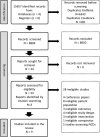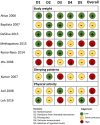Effectiveness of interventions to address obesity and health risk behaviours among people with severe mental illness in low- and middle-income countries (LMICs): a systematic review and meta analysis
- PMID: 36618743
- PMCID: PMC9806988
- DOI: 10.1017/gmh.2022.21
Effectiveness of interventions to address obesity and health risk behaviours among people with severe mental illness in low- and middle-income countries (LMICs): a systematic review and meta analysis
Abstract
Introduction: People with severe mental illness (SMI) are more likely to have obesity and engage in health risk behaviours than the general population. The aims of this study are (1) evaluate the effectiveness of interventions that focus on body weight, smoking cessation, improving sleeping patterns, and alcohol and illicit substance abuse; (2) Compare the number of interventions addressing body weight and health risk behaviours in low- and middle-income countries (LMICs) v. those reported in published systematic reviews focusing on high-income countries (HICs).
Methods: Intervention studies published up to December 2020 were identified through a structured search in the following database; OVID MEDLINE (1946-December 2020), EMBASE (1974-December 2020), CINAHL (1975-2020), APA PsychoINFO (1806-2020). Two authors independently selected studies, extracted study characteristics and data and assessed the risk of bias. and risk of bias was assessed using the Cochrane risk of bias tool V2. We conducted a narrative synthesis and, in the studies evaluating the effectiveness of interventions to address body weight, we conducted random-effects meta-analysis of mean differences in weight gain. We did a systematic search of systematic reviews looking at cardiometabolic and health risk behaviours in people with SMI. We compared the number of available studies of LMICs with those of HICs.
Results: We assessed 15 657 records, of which 9 met the study inclusion criteria. Six focused on healthy weight management, one on sleeping patterns and two tested a physical activity intervention to improve quality of life. Interventions to reduce weight in people with SMI are effective, with a pooled mean difference of -4.2 kg (95% CI -6.25 to -2.18, 9 studies, 459 participants, I 2 = 37.8%). The quality and sample size of the studies was not optimal, most were small studies, with inadequate power to evaluate the primary outcome. Only two were assessed as high quality (i.e. scored 'low' in the overall risk of bias assessment). We found 5 reviews assessing the effectiveness of interventions to reduce weight, perform physical activity and address smoking in people with SMI. From the five systematic reviews, we identified 84 unique studies, of which only 6 were performed in LMICs.
Conclusion: Pharmacological and activity-based interventions are effective to maintain and reduce body weight in people with SMI. There was a very limited number of interventions addressing sleep and physical activity and no interventions addressing smoking, alcohol or harmful drug use. There is a need to test the feasibility and cost-effectiveness of context-appropriate interventions to address health risk behaviours that might help reduce the mortality gap in people with SMI in LMICs.
Keywords: Health risk behaviours; low and middle income countries; schizophrenia; severe mental illness.
© The Author(s) 2022.
Figures




References
-
- Acil AA, Dogan S and Dogan O (2008) The effects of physical exercises to mental state and quality of life in patients with schizophrenia. Journal of Psychiatric and Mental Health Nursing 15, 808–815. - PubMed
-
- Akers J, Aguiar-Ibáñez R and Baba-Akbari A (2009) Systematic reviews: CRD's guidance for undertaking reviews in health care. York, UK: Centre for Reviews and Dissemination, University of York.
-
- Ashdown-Franks G, Williams J, Vancampfort D, Firth J, Schuch F, Hubbard K, Craig T, Gaughran F and Stubbs B (2018) Is it possible for people with severe mental illness to sit less and move more? A systematic review of interventions to increase physical activity or reduce sedentary behaviour. Schizophrenia Research 202, 3–16. - PubMed
-
- Baptista T, Rangel N, Fernández V, Carrizo E, El Fakih Y, Uzcátegui E, Galeazzi T, Gutiérrez MA, Servigna M, Dávila A, Uzcátegui M, Serrano A, Connell L, Beaulieu S and de Baptista EA (2007) Metformin as an adjunctive treatment to control body weight and metabolic dysfunction during olanzapine administration: a multicentric, double-blind, placebo-controlled trial. Schizophrenia Research 93, 99–108. - PubMed
Publication types
LinkOut - more resources
Full Text Sources
Miscellaneous
